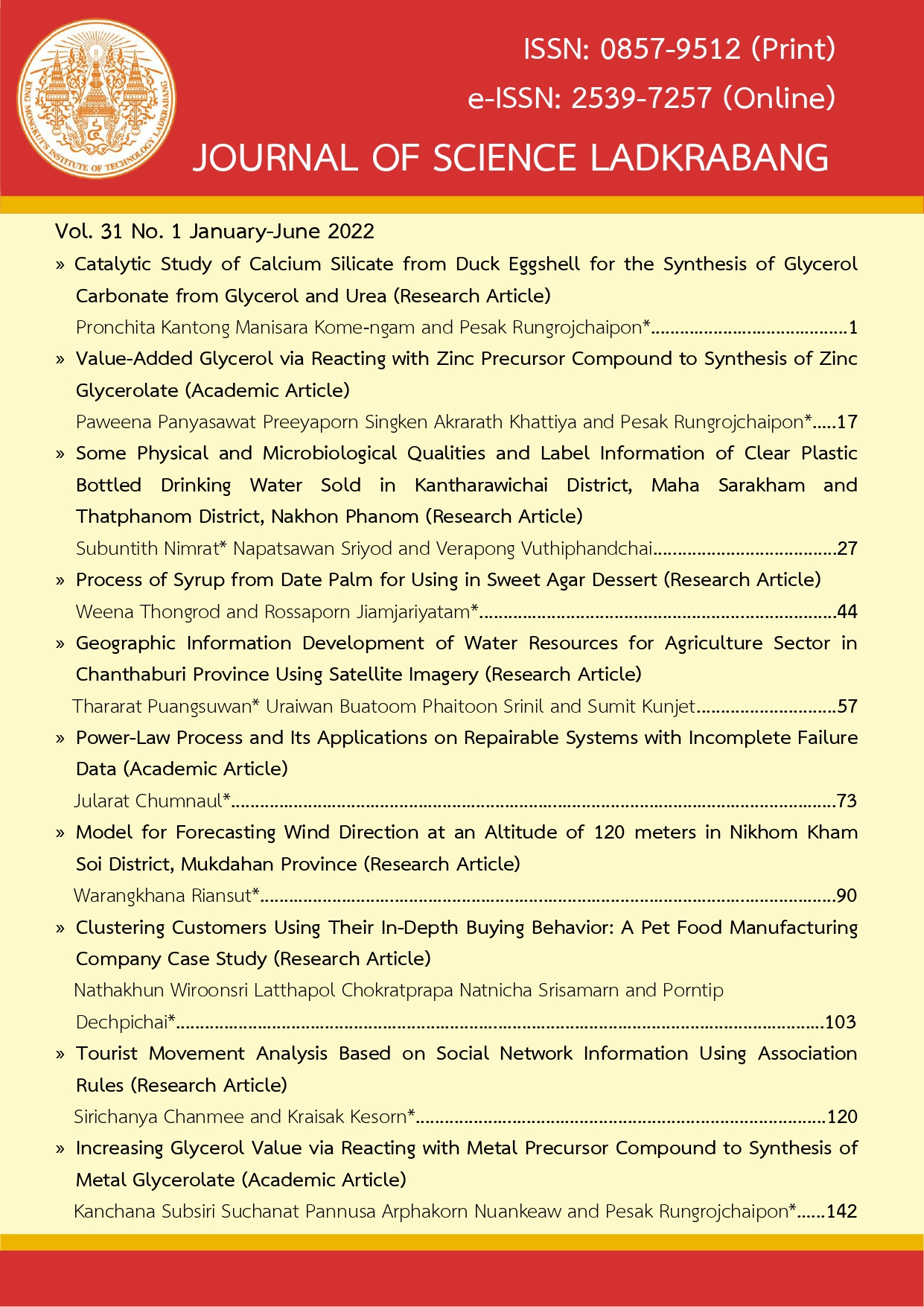Power-Law Process and Its Applications on Repairable Systems with Incomplete Failure Data
Main Article Content
Abstract
The power-law model is a widely used model to examine and evaluate the reliability of repairable systems before they are used or sold to customers. In this article, basic statistical inference for parameters of the power-law model with incomplete failure data is presented, and it will take into account cases where some failure times in the early phase of system testing cannot be recorded. This type of incomplete failure data is a common occurrence during the process of system development and essential to establish a warranty policy for products. In addition, at the end of this article, an example is given to illustrate the application of the power-law process to engine failure times where some data cannot be recorded.
Article Details

This work is licensed under a Creative Commons Attribution-NonCommercial-NoDerivatives 4.0 International License.
References
จุฬารัตน์ ชุมนวล. 2563. กระบวนการเพาเวอร์ลอว์และการประยุกต์ใช้กับระบบที่ซ่อมแซมได้. วารสารวิทยาศาสตร์ประยุกต์, 19(2), 175-187. [Chumnaul, J. 2020. Power-law process and its applications on repairable systems. The Journal of Applied Science, 19(2), 175-187. (in Thai)]
Chumnaul, J. 2019. Inferences on the power-law process with applications to repairable systems. Ph.D. thesis, Mississippi State University.
Chumnaul, J. and Sepehrifar, M. 2018. Generalized confidence interval for the scale parameter of the power-law process with incomplete failure data. Computational Statistics and Data Analysis, 128, 17-33.
Finkelstein, J.M. 1976. Confidence bounds on the parameters of Weibull process. Technometrics, 18(1), 115-117.
Crow, L.H. 1982. Confidence Interval Procedures for the Weibull Process with Application to Reliability Growth. Technometrics, 24(1), 67–72.
Lee, L. and Lee, S.K. 1978. Some Results on Inference for the Weibull Process. Technometrics, 20(1), 41-45.
Kyparisis, J. and Singpurwalla, N.D. 1985. Bayesian Inference for the Weibull Process with Applications to Assessing Software Reliability Growth and Predicting Software Failures. Computer Science and Statistics: Proceedings of the Sixteenth Symposium on the Interface (ed. L. Billard), Amsterdam, 57-64.
Shaul, K.B., Idit, L. and Benjamin, R. 1992. Bayesian Inference for the Power Law Process. Annals of the Institute of Statistical Mathematics, 44, 623-639.
Gaudoin, O., Yang, B. and Xie, M. 2003. A Simple Goodness-of-Fit Test for the Power- Law Process, Based on the Duane Plot. IEEE Transactions on Reliability, 52(1), 69-74.
Gaudoin, O., Yang, B. and Xie, M. 2006. Confidence intervals for the scale parameter of the power-law process. Communications in Statistics - Theory and Methods, 35(8), 1525–1538.
Cocozza-Thivent, C. 1997. Processus Stochastiques Et Fiabilite Des Systemes. Springer Verlag: Berlin.
Wang, B., Xie, M. and Zhou, J. 2013. Generalized confidence interval for the scale parameter of the power-law process. Communications in Statistics - Theory and Methods, 42, 898-906.
Yu, J.W., Tian, G.L. and Tang, M.L. 2008. Statistical inference and prediction for the Weibull process with incomplete observations. Computational Statistics and Data Analysis, 52(3), 1587-1603.
Tian, G.L., Tang, M.L. and Yu, J.W. 2011. Bayesian Estimation and Prediction for the Power Law Process with Left-Truncated Data. Journal of Data Science, 9(3), 445–470.
Dempster, A.P., Laird, N.M. and Rubin, D.B. 1977. Maximum likelihood from incomplete data via the EM algorithm (with discussion). Journal of the Royal Statistical Society. Series B., 39(1), 1–38.
Zhou, Y.Q. and Weng, Z.X. 1992. Reliability growth. Science Press: Beijing.
Engelhardt, M., Bain, L.J. and Blumenthal, B. 1992. Statistical Analysis of a Weibull Process with Left-Censored Data. Survival Analysis: State of the Art, NSSE 211, 173–195.

